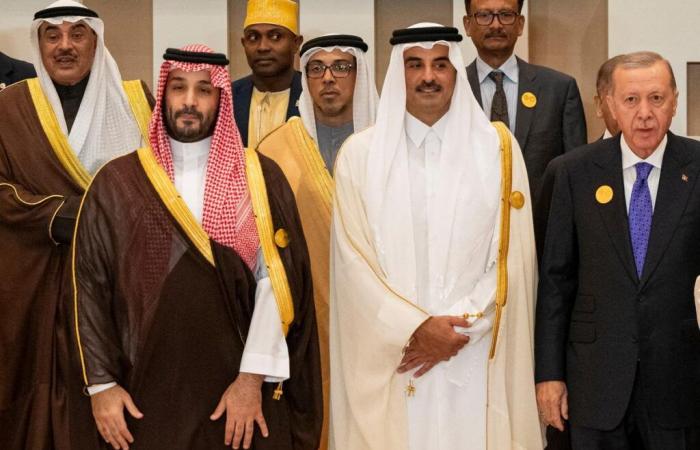Comments collected by Richard Godin
Published on November 12, 2024 at 5:50 p.m.
Front, from left: Crown Prince of Kuwait, Sabah al-Ahmed al-Sabah, Crown Prince of Saudi Arabia, Mohammed Bin Salman, Deputy Prime Minister of the United Arab Emirates, Mansour bin Zayed Al Nahyan, l Qatar's Emir Tamim Bin Hamad al-Thani and Turkish leader Recep Tayyip Erdogan during a summit in Riyadh, Saudi Arabia, November 11, 2024. ABDULLA AL-NEYADI / AFP
Facebook Twitter E-mail Copy link
Send
Free access
Interview Meeting in Saudi Arabia on Monday, the leaders of Arab and Muslim countries called on Israel to withdraw from occupied territories to achieve “comprehensive” peace in the Middle East. Statements without much significance, judges political scientist Antoine Basbous.
After the failure of a first summit in 2023, Riyadh brought together the leaders of Arab and Muslim countries on Monday, November 11. In a joint statement, they not only called for a ceasefire in Gaza and Lebanon, but also called on Israel to completely withdraw from the Arab territories it occupies in order to achieve peace. “global” in the Middle East.
This joint summit of the Arab League and the Organization of Islamic Cooperation, hosted by regional heavyweight Saudi Arabia, was said to represent an opportunity for its participants to set their expectations for the future administration of the president-elect American, Donald Trump. Could this have an impact on the future of the region? Response from Antoine Basbous, director of the Arab Countries Observatory and partner of Forward Global.
In addition to calling for a ceasefire in Gaza and Lebanon, Arab leaders called on Israel to withdraw from the occupied territories (the West Bank, East Jerusalem and the Syrian Golan) and called for the creation of a state Palestinian to achieve a “comprehensive” peace in the Middle East. Is this position new? Can it have an impact?
This meeting, which takes place a year to the day after the previous one, does not have much scope. The participants are content to make statements so that they cannot be blamed for their inaction. The reference is always the Arab summit in Beirut in 2002 where an Arab peace plan was presented. Can they say less than asking Israel to withdraw from the occupied territories? No. Could they have not mentioned the creation of a Palestinian state? No, it's a litany. The proof: two months ago, Saudi Arabia had already announced a coalition to work towards the establishment of a Palestinian state…
Also read
Narrative A youth in Gaza: “I dream of a world where I miss my bus and spill coffee on my favorite t-shirt”
Free
Read later
There's not really any change. These are elements of language that are not coercive. In 1973, during the Yom Kippur War, Arab oil-exporting countries cut production in protest. There, there are no threats and the United States has become an exporter of hydrocarbons. Between the 2023 summit and Monday's summit, the death toll in Gaza rose from around 4,000 to 43,000. If Arab and Muslim countries were truly on the same page and wanted to do something about the situation current, they could have reacted much sooner.
What are the disagreements between Arab and Muslim countries?
After the major failure of the American withdrawal from Afghanistan, which marked their disinterest in the region, the Arab allies of the United States were afraid of being insecure and divided into two groups. Some of the Arabs sought to have a multipolar relationship by moving closer in particular to China, which mainly sources oil from the Gulf. The hope then was that the Chinese would guarantee peace in the region due to common economic interests. Another part of the Arabs saw Israel as a replacement for the United States, hence the Abraham Accords. But they took a cold shower on October 7, 2023 when they saw that the Jewish state was not capable of defending itself in its own sanctuary – so how can you defend its allies more than a thousand kilometers away?
Also read
Interview “It would be a mistake to think that Trump and Netanyahu naturally get along well”
Subscriber
Read later
Another disagreement: unlike Iran and its allies, neither party has supported or will support Hamas or Hezbollah. This is why, at the outbreak of the war in Gaza, they did the minimum service in terms of support so that their public opinion did not turn completely against them, but without ever showing support for the Islamist militias. Besides, there is also Qatar which financed and hosted Hamas, often at the request of Washington and Tel Aviv. There is therefore no “Arab point of view”, but points of view with variable geometry, depending on the country.
Saudi Crown Prince Mohammed bin Salman has called Iran a “sister Republic.” Why is Saudi Arabia moving closer to the Islamic Republic? What consequences could this have on the region?
One lesson from this diplomatic sequence is that Iran is being spared. We had the visit of the Chief of Staff of the Saudi army to Tehran, the reception of the Vice-President of the Iranian Republic by Mohammed ben Salman… There are gestures of appeasement towards Iran, while criticizing this country because of its support for Hamas, Hezbollah as well as the Iraqi militias and the Houthis who regularly harass Saudi Arabia.
To the extent that Riyadh does not want to align itself with Tehran's adversaries so as not to suffer its violent reactions, the kingdom is playing appeasement. Saudi Arabia has an agenda that can be summed up in one word: modernization and foreign investment. But this can only be done in the event of peace. This requires regional pacification, while the sanctions of the United States and the threats of Israel have still not borne fruit. Saudi Arabia is not going to sacrifice its neighborly relations for pipe dreams.
Comments collected by Richard Godin






